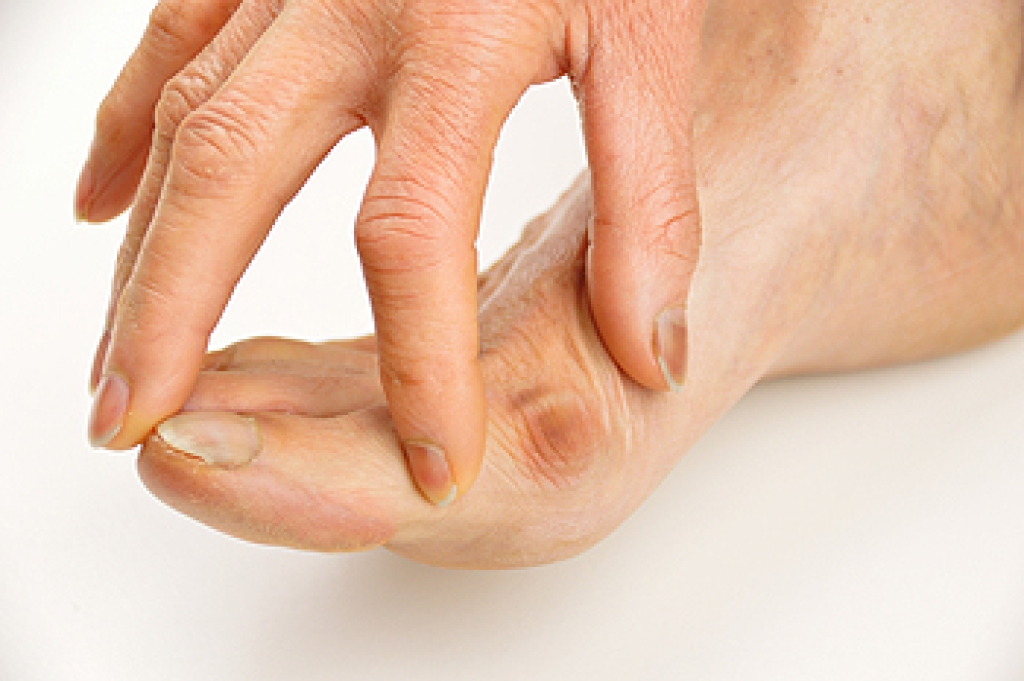 A bunion is a bony bump that forms on the joint at the base of the big toe, causing it to deviate towards the other toes. This condition, known as hallux valgus, can result from genetic predisposition, wearing tight or narrow shoes, arthritis, or stress on the foot. Symptoms include pain, swelling, redness, and difficulty in walking. Additionally, the skin over the bunion may gradually become thickened and tender. Diagnosis typically involves a physical examination and X-rays to assess the severity and underlying bone structure. Treatment options range from conservative methods such as wearing wider shoes, using orthotic devices, and taking anti-inflammatory medications, to more invasive procedures like bunion surgery for severe cases. Untreated bunions can lead to complications such as chronic pain, bursitis, hammertoe, and difficulty finding comfortable footwear. If you have a bunion that is causing you discomfort, it is suggested that you schedule an appointment with a podiatrist for a tailored treatment plan.
A bunion is a bony bump that forms on the joint at the base of the big toe, causing it to deviate towards the other toes. This condition, known as hallux valgus, can result from genetic predisposition, wearing tight or narrow shoes, arthritis, or stress on the foot. Symptoms include pain, swelling, redness, and difficulty in walking. Additionally, the skin over the bunion may gradually become thickened and tender. Diagnosis typically involves a physical examination and X-rays to assess the severity and underlying bone structure. Treatment options range from conservative methods such as wearing wider shoes, using orthotic devices, and taking anti-inflammatory medications, to more invasive procedures like bunion surgery for severe cases. Untreated bunions can lead to complications such as chronic pain, bursitis, hammertoe, and difficulty finding comfortable footwear. If you have a bunion that is causing you discomfort, it is suggested that you schedule an appointment with a podiatrist for a tailored treatment plan.
If you are suffering from bunion pain, contact one of our podiatrists of Columbus Podiatry & Surgery. Our podiatrists can provide the care you need to keep you pain-free and on your feet.
What Is a Bunion?
Bunions are painful bony bumps that usually develop on the inside of the foot at the joint of the big toe. As the deformity increases over time, it may become painful to walk and wear shoes. Women are more likely to exacerbate existing bunions since they often wear tight, narrow shoes that shift their toes together. Bunion pain can be relieved by wearing wider shoes with enough room for the toes.
Causes
- Genetics – some people inherit feet that are more prone to bunion development
- Inflammatory Conditions - rheumatoid arthritis and polio may cause bunion development
Symptoms
- Redness and inflammation
- Pain and tenderness
- Callus or corns on the bump
- Restricted motion in the big toe
In order to diagnose your bunion, your podiatrist may ask about your medical history, symptoms, and general health. Your doctor might also order an x-ray to take a closer look at your feet. Nonsurgical treatment options include orthotics, padding, icing, changes in footwear, and medication. If nonsurgical treatments don’t alleviate your bunion pain, surgery may be necessary.
If you have any questions, please feel free to contact our office located in Columbus, OH . We offer the newest diagnostic and treatment technologies for all your foot care needs.
